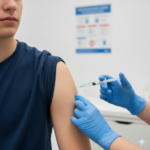Dr Randy Kyes Retires After 35 Years of Global Conservation, Education and Empathy
December 1, 2025

Dr. Kyes and wife Elle in Thailand in 2021. After 35 years with the Washington National Primate Research Center (WaNPRC) and the University of Washington, Dr. Randall (‘Randy’) Kyes, Unit Chief of the Center’s Unit of Global Programs, Research Professor in the Dept. of Psychology, adjunct in the Depts. of Global Health and Anthropology, and…
Neuro Unit Shines at SfN
November 17, 2025

Researchers from the Washington National Primate Research Center Neuroscience Unit made a big impact at this year’s Society for Neuroscience (SfN) meeting, sharing 27 different scientific presentations. This large wide-ranging set of contributions shows how our teams are helping push neuroscience forward in meaningful, practical ways. The studies covered everything from basic brain wiring to…
Survey: People Trust Vets on Animal Research
November 6, 2025

A new national survey on public attitudes toward animal research indicates that trust, and communication based in facts, play a huge role in acceptance for the work. The survey identified veterinarians (81%) and scientists (77%) as the most trusted sources of information. The study, conducted in part by Dr. Sally Thompson-Iritani, Assistant Vice Provost for…
Committed to Care at Every Step
October 30, 2025

Transporting nonhuman primates between facilities is a complex, tightly regulated process that prioritizes animal welfare, safety, and legal compliance at every step. Each shipment involves extensive coordination among veterinarians, animal care teams, and logistics specialists, following detailed standard operating procedures that govern everything from health screening to the chopping of fruits and vegetables packed for…
New Leader for Global Programs Named
October 16, 2025

Photo Courtesy: Central Oregon Community College Washington National Primate Research Center Director, Dr. Deborah Fuller today welcomed Dr. Matthew Novak as the new Associate Director of Global Conservation, Education and Outreach. He will be replacing Dr. Randall Kyes, who is retiring from the post at the end of this year. Dr. Novak is currently a…
NAM-Specific Study to Map Immune System
October 10, 2025

The Washington National Primate Research Center has announced its first Ignition award specifically aimed at supporting a New Approach Methodology (NAM) in a study. WaNPRC has long supported a 3Rs approach to reduce, refine and replace animal models, this award specifically names NAMs. The Veterinary Medicine & Science Convergence and NAM Award has been awarded to Dr…
Director Fuller: Viruses Don't See Borders
September 23, 2025

Vaccines access is becoming a national checkerboard of availability, with wide gaps between where they're available and where they're not. Among the problems this patchwork creates: Parents say they can’t find a COVID vaccine without driving two hours. They say their doctor’s offices aren’t ordering the vaccine because the CDC isn’t recommending it for children…
Proposed Federal Cuts to Animal Testing Spur Scientific Debate
July 30, 2025

The NIH and FDA efforts to shift away from animal testing, promoting “new approach methodologies” (NAMs) like AI, organoids, and organ-on-a-chip systems are not finding unanimous support in the scientific community. The goal is to improve research efficiency, lower costs, and reduce harm to animals. While some scientists support the move as overdue, others warn…
Study: Electrical Brain Stimulation Reduces Damage from Stroke
July 24, 2025

A new study led by researchers at the Washington National Primate Research Center shows that applying electrical stimulation to the brain within an hour of stroke onset may significantly reduce brain damage. The findings, published July 21, 2025, in Nature Communications, advance stroke intervention research and suggest a potential new path for early treatment in…
WaNPRC Research Led to “Game-Changer” HIV Drugs
July 3, 2025

You can trace a direct line between the recent headline-grabbing FDA approval of HIV prevention and treatment drugs to research at the Washington National Primate Research Center (WaNPRC). And the history of WaNPRC’s involvement in fighting the HIV epidemic goes back years. While media coverage of Yeztugo, formally known as lenacapavir or Sunlenca, is understandably…